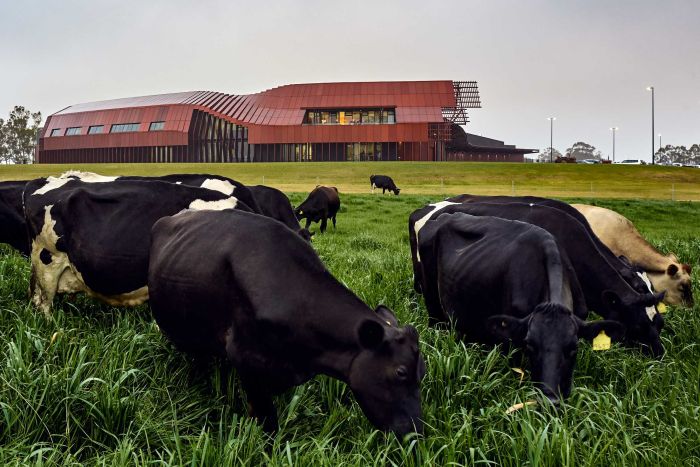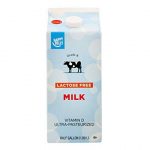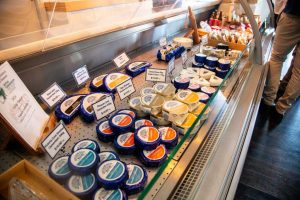
The ‘see-for-yourself’ design at Bannister Downs in Northcliffe does not just include farm tours like some other Australian dairies have recently implemented.
The 5,000-square-metre, two-storey facility in the state’s south-west has been constructed to include a viewing room which looks out over its new robotic rotational dairy and also a cafe where you can try the product.
The move comes amid the rise of the socially-conscious consumer, which has seen the dairy industry — along with many others in the agricultural sector — under increasing pressure.
Increasing transparency is something peak body Dairy Australia has been pushing for in their own marketing strategies for the industry.
“Public expectation of the food industry is changing and as a result the discussion around dairy has really changed,” said Dairy Australia communications strategy manager Glenys Zucco.
“A decade ago consumers were asking us whether they should choose full-fat or low-fat milk, but today’s consumers really want to know more about where their food comes from and how it’s processed,” she said.
Ms Zucco said Bannister Down’s move to implement tourism into the business was a good step toward that.
“It’s such a proactive initiative, it really taps into that growing need for transparency and information,” she said.
‘It helps people understand farming better’
After two years of construction, the ‘creamery’, as it has been dubbed, was completed late last year and is expected to be opened to the public by Easter 2019.
Managing director of Bannister Downs Sue Daubney said it was about allowing the consumer to see the innovation at the farm and showing the practices for the broader industry.
“I think it helps people understand farming better because what we do, really, is no different to what 96 per cent of farms are doing,” she said.
“Not all farms are set up to invite visitors though because there are all sorts of ramifications for safety and insurances and there’s a big cost associated with that.
“By us opening our doors, hopefully it will answer the questions on behalf of a lot of farmers that the general public might have.”
The facility, which is a partnership between Bannister Downs and billionaire mining magnate Gina Rinehart, also includes a robotic rotational dairy — one of only four in Australia — something that is known to attract a lot of visitors.
Tourism no saviour for struggling dairy industry
The popularity of their site is yet to be seen, but Mrs Daubney said she doubted the branch into tourism would be raking in much profit.
“I think it’s going to be at a cost,” she said.
“It’s definitely not a driver in a business model — it’s more about transparency, sharing with people the positives of our industry and the excitement in agriculture and the technology.”
Mrs Daubney said it was also about giving the consumer confidence in the brand.
“Once people come down and see the product getting made, they get a connection to it,” she said.
“They realise we’re just a damn hard-working family business and they go away with a degree of loyalty.”
Could other dairies follow suit?
In a tough financial climate for dairy, however, it might be difficult for others to follow suit to the same degree.
WAFarmers dairy section president Michael Partridge said the innovation shown by the Daubneys was one to be commended.
But he said the cost and the time associated with having regular public tours was not viable for many farms.
“It’s got to be economically viable to go down that path and with what Bannister Downs have, with their new factory and robot milking, it’s certainly something which people want to have a look at,” he said.
Mr Partridge said, despite some public perception that they were not transparent, the dairy industry had made a lot of effort in showing the public exactly what they did on the farm.
“For the people who say we work in secrecy and have transparency, it blows it up them a bit,” he said.
“The Aussie Farms map that was published the other day has our farm on it but we have tours on our farm, we’ve had four different TV shows show the production system on our farm and then to be accused of secrecy, lack of transparency and that kind of behaviour is insulting.”

























